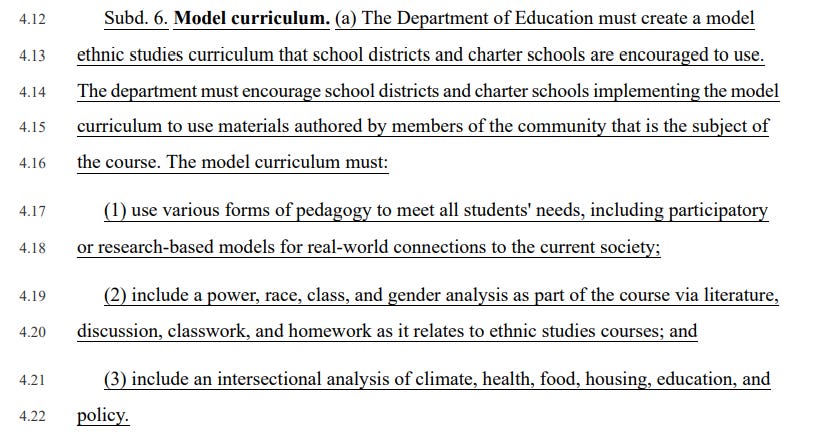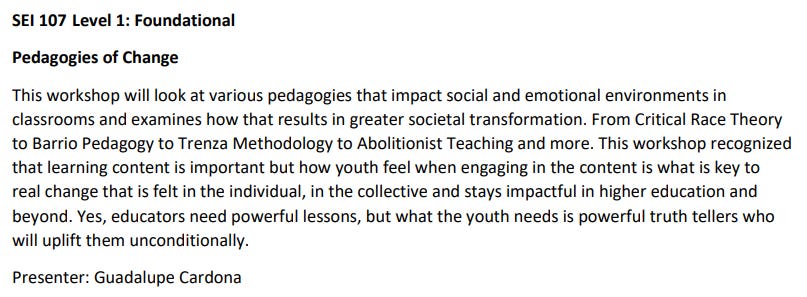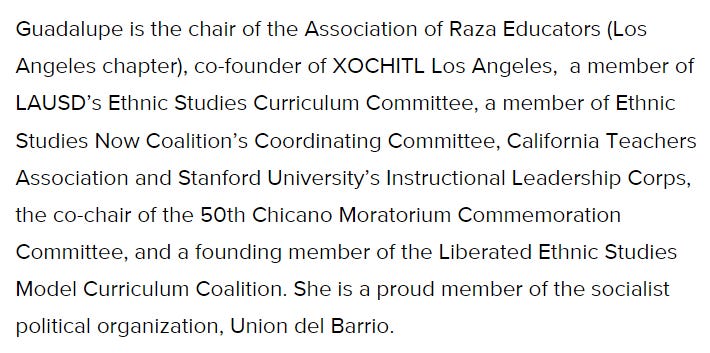Socialism, Ethnic Studies and the NEA
A controversial ethnic studies consortium, its direct ties to a socialist activist group, and its access to the most powerful teacher union in the country.
On March 13, Guadalupe Carrasco Cardona, a controversial proponent of “liberated ethnic studies” spoke several times at the National Educators Association’s leadership summit in Las Vegas on the “Pedagogies of Change” and “Ethnic Studies: Promise and Possibilities,” pushing a growing field of studies that teaches minority students they are victims of “intergenerational cultural genocide” and isolates white students and teachers for studies on “decentering whiteness.”
The speaking slots at a meeting of one of the country’s two largest teachers’ unions underscore the growing influence of Cardona and a new Los Angeles-based nonprofit, Liberated Ethnic Studies Model Curriculum Consortium, that she cofounded, very much a part of the for-profit “woke-industrial complex” that angers parents with its focus on activism, not academics. After drawing attention in a high-profile battle in California over the past several years, the field of “liberated ethnic studies” is spreading throughout the country in K-12 schools from California to Massachusetts, as school districts spend tens of thousands of dollars on the new curriculum, the consortium bragging, for example, on its website that its curriculum is in the California cities of Hayward, Riverside, Salinas and Santa Cruz.
In February, Democratic lawmakers introduced a pair of bills, HF3434 and SF3557, in the Minnesota House and Senate, creating an “ethnic studies task force” to establish ethnic studies as a graduation requirement for students. In the bills, the state Department of Education would create a model ethnic studies curriculum that school districts are “encouraged to use.” The legislation lays out that the curriculum must “include a power, race, class, and gender analysis as part of the course” and “include an intersectional analysis of climate, health, food, housing, education, and policy.”
In Massachusetts, Holyoke Public Schools offers students the opportunity to “choose to study English and History through the lens of Ethnic Studies” as part of its Freshman Academy. In Colorado, Denver Public Schools sent parents a survey on March 11, requesting feedback on making ethnic studies a graduation requirement. Starting in fall 2021, Middleton-Cross Plains Area School District in Wisconsin started requiring all ninth graders to take a course called, “Land, People and Power: An Ethnic Studies approach to U.S. History.”
In a Jan. 29 statement to school districts, the consortium said it focuses on four “racialized communities of color” – Native American, African American, Asian American and “Latinx/a/os-Chicana/o/xs.” Its work extended to “BIPOC,” or “Black, Indigenous and People of Color,” and said that it works with “non-BIPOC allies, including Jewish Americans allies,” to “cultivate compassion while eradicating systems of oppression,” notably often from the work of its architects, the state of Israel.
Listed under the category of Social Emotional Learning (SEL), Cardona’s session on “Pedagogies of Change” at the annual teachers’ union conference featured her speaking about “various pedagogies that impact social and emotional environments in classrooms” and “how they result in greater societal transformation.” The promotional material for the session noted the lesson would be wide-ranging: “From Critical Race Theory to Barrio Pedagogy to Trenza Methodology to Abolitionist Teaching and more.” “Barrio Pedagogy” involves the “elements of problematization,” "taking place in the barrio and in the school.” A “barrio” is a Spanish-speaking neighborhood. “Trenza Methodology” is a “metaphorical–analytical tool for gaining critical and nuanced understandings,” and “Abolitionist Teaching” is a teaching pedagogy focusing on “humanity” and “transformation.”
Cardona has garnered controversy in the past. In 2018, El Rancho Unified School District in southern California, outside Los Angeles, fired her from her job as an “ethnic studies” teacher after parents protested lessons that included “racism.” Parents also raised concern about her role in Raza Educators, an educator activist organization based in Los Angeles and San Diego where she functions as “praxis chair,” and a member of Union del Barrio, a self-described “political organization” based in Los Angeles and San Diego that describes itself as “socialists” who believe in “Radical Nationalism.”
An ethnic studies teacher in Los Angeles Unified School District since August 2021, according to her LinkedIn profile, Cardona is also part of the “Coordinating Committee” of the “Ethnic Studies Now Coalition,” a Los Angeles-based activist group “working towards making Ethnic Studies accessible.” She is an open socialist and lists herself as a member of the Association of Raza Educators, which describes itself as a group of public-school educators, university professors, students and community allies “committed to using education as a tool for the liberation of our community.”
The Liberated Ethnic Studies Model Curriculum Consortium is well represented in the NEA; staff members Taunya Jaco and Mary Levi serve on the NEA’s Ethnic Minority Affairs Committee. Theresa Montaño, one of the consortium’s lead faculty members, served six years as “an NEA director” according to the consortium’s website. Montaño also served as Vice-President of the California Teachers Association.
Cardona and fellow ethnic studies author, activist, and educator R. Tolteka Cuauhtin were elected to the United Teachers Los Angeles/ NEA At-Large Board of Directors in October 2021.
In 2019, Cuauhtin, and academics Miguel Zavala, Christine Sleeter and Wayne Au published a seminal book, Rethinking Ethnic Studies, in the new field of teaching, including lessons on “Colonization and Dehumanization” and “Hegemony and Normalization.” The authors state that under “hegemony” the “dominant beliefs of an oppressor (hegemon) become normal and implicit,” while “manipulating and submerging oppressed peoples” and “in certain cases, completing intergenerational cultural genocide and making it appear normal.”
The authors defined ethnic studies as “both about the critique of unequal power and the reclamation of power by marginalized and oppressed communities.” For the authors, ethnic studies is about building “a movement that focuses on anti-racist and decolonizing curriculum and teaching.”






